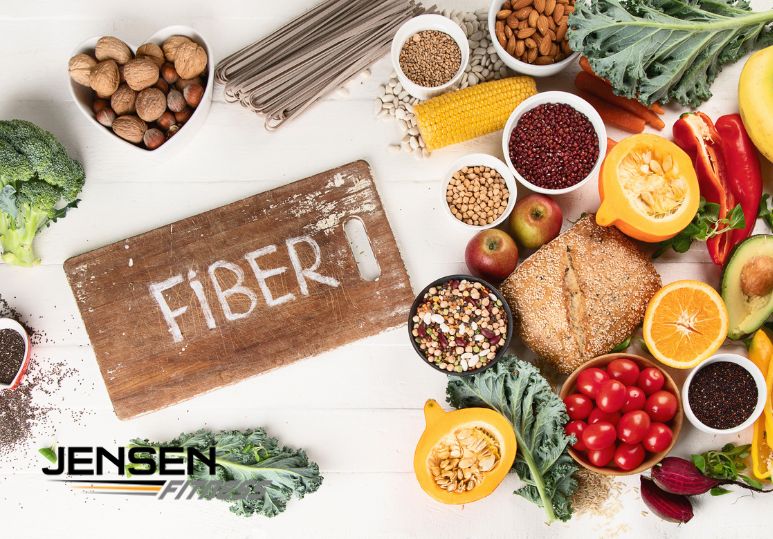Calgary Dietitian: The Importance of Fiber in a Perimenopausal Diet

Perimenopause brings various physical and emotional changes, but a high-fiber diet can help manage symptoms and promote well-being. Fiber supports digestive health by alleviating constipation and bloating, aids in weight management by controlling appetite, and helps balance hormones by promoting the excretion of excess estrogen. It also supports heart health by lowering cholesterol levels. Foods like oats, fruits, vegetables, whole grains, and legumes are rich in fiber and beneficial for perimenopausal women. At Jensen Fitness in Calgary, our dietitians can create personalized nutrition plans to incorporate these fiber-rich foods, helping you navigate perimenopause with ease and confidence. Embrace the power of nutrition for a healthier, happier transition. Call us or book your consultation and speak with our experts!
Perimenopause is a significant transitional phase in a woman's life, often accompanied by a range of physical and emotional changes. As hormone levels fluctuate, many women experience symptoms like weight gain, digestive issues, mood swings, and decreased energy levels. While these changes can be challenging, the right dietary choices can make a significant difference in managing symptoms and promoting overall well-being. One essential dietary component that plays a crucial role during perimenopause is fiber. In this blog, we’ll explore why fiber is so important during this stage of life and how it can support women through perimenopause.
Promoting Digestive Health
One of the most common issues women face during perimenopause is digestive discomfort, including bloating, constipation, and irregular bowel movements. Fiber, particularly soluble fiber, can help alleviate these issues by promoting regularity and improving overall digestive health. Soluble fiber absorbs water and forms a gel-like substance in the digestive tract, which can soften stools and make them easier to pass. Foods rich in soluble fiber include oats, apples, citrus fruits, carrots, and legumes. Incorporating these foods into your diet can help maintain a healthy digestive system and reduce discomfort.
Managing Weight Gain
Weight gain is a frequent concern during perimenopause due to hormonal changes that affect metabolism and fat distribution. A high-fiber diet can be beneficial for weight management. Fiber-rich foods tend to be more filling, helping to control appetite and reduce overall calorie intake. Additionally, fiber slows down the digestion process, which can help stabilize blood sugar levels and prevent insulin spikes that lead to fat storage. Whole grains, vegetables, fruits, and legumes are excellent sources of fiber that can support healthy weight management during perimenopause.
Balancing Hormones
Hormonal fluctuations are a hallmark of perimenopause, often leading to symptoms like mood swings, hot flashes, and night sweats. Fiber can play a role in hormone regulation by binding to excess estrogen in the digestive tract and promoting its excretion from the body. This process helps balance hormone levels and may reduce the severity of perimenopausal symptoms. Flaxseeds, chia seeds, and other high-fiber foods have been shown to support hormonal balance and alleviate some of the discomforts associated with perimenopause.
Supporting Heart Health
Heart health becomes increasingly important during perimenopause as the risk of cardiovascular disease rises with declining estrogen levels. Fiber, particularly soluble fiber, has been shown to help lower cholesterol levels by binding to cholesterol particles and removing them from the body. This process can reduce the risk of heart disease and improve overall cardiovascular health. Foods like oats, barley, beans, and fruits are rich in soluble fiber and can be easily incorporated into daily meals to support heart health during perimenopause.
Fiber is a vital component of a healthy diet, offering numerous benefits that can help manage the symptoms of perimenopause and support overall well-being. From promoting digestive health and managing weight gain to balancing hormones and supporting heart health, fiber plays a crucial role in maintaining a healthy and comfortable perimenopausal journey.
At Jensen Fitness in Calgary, our experienced dietitians understand the unique nutritional needs of women during perimenopause. We can help you develop a personalized nutrition plan that includes fiber-rich foods tailored to your specific symptoms and health goals. By making informed dietary choices and incorporating more fiber into your meals, you can navigate perimenopause with greater ease and confidence.
If you’re experiencing perimenopausal symptoms and want to explore the benefits of a high-fiber diet, our team at Jensen Fitness is here to support you. Contact us today to schedule a consultation and take the first step towards a healthier, happier perimenopausal journey. Embrace the power of nutrition and let us guide you through this transitional phase with expertise and compassion. Please call us or book a consultation to see how we can help.
FAQs
Clients seeking weight loss, fitness improvement, or better overall health benefit from customized nutrition coaching at Jensen Fitness. Contact us to book your consultation!
Many women experience symptoms like weight gain, hot flashes, poor sleep, mood swings, brain fog, and low energy. These changes are caused by shifting hormones—and they can be managed with the right strategies.
Jensen Fitness considers your body type, activity level, and dietary preferences to build a realistic and effective meal plan. Contact us today to book your consultation!
CONTACT US TODAY!
Ready to begin your transformation?
Have questions or feedback? Call us at 1-403-200-0199 or complete the form below to get started.


